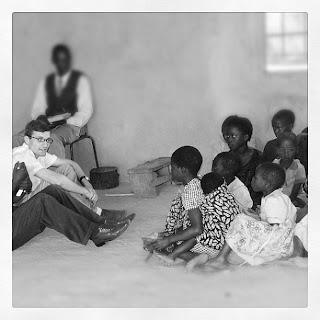'Is that a thing?': On Teachers in the Body of Christ
 |
| Teaching the children in Kasungu. |
Well, yes, that is a thing. So, for all of you who had the same question lurking in the back of your minds, here's why it is a thing.
For a start, there's Ephesians 4:11, the favourite Apostolic verse for pointing out the validity of apostles and prophets for today: 'And He Himself gave some to be apostles, some prophets, some evangelists, and some pastors and teachers.' Christ hasn't only given apostles and pastors to His Church, but apostles, prophets, evangelists, pastors and teachers. Now, admittedly, some exegetes have interpreted Eph. 4:11 to teach only four ministries, instead of five, combining the roles of pastor and teacher (notice how there's no 'some' in front of 'teachers'), but then this isn't the only New Testament passage to talk about teachers.
Yesterday we had a look at James 3:1 which mentions the stricter judgement for teachers. Although James is aiming his warning at those who aren't teachers, the warning he gives presupposes that there is such a thing as a teacher.
In the book of Acts we see an example of teachers in the Body of Christ, for in Acts 13:1 we read, 'Now in the church that was at Antioch there were certain prophets and teachers.' These prophets and teachers met together to fast and pray, and as they did so God spoke through the prophet to call Paul and Barnabas as apostles and send them out on their missionary journeys. Acts 13 shows us not only that there was such a thing as a teacher, but that they were involved in the government of the church.
In fact, it's interesting that in the book of Acts no one is specifically said to be a pastor, and yet this group of prophets and teachers are mentioned by name. Paul and Barnabas were both among this group of men and so were already either prophets or teachers before being called as apostles. Although some have argued that Paul was a prophet, he specifically calls himself a teacher, as well as an apostle, in 1 Tim. 2:7 and 2 Tim. 1:11. It's more than probable that Barnabas was also a teacher, as the two are noted for their teaching the church together in Antioch (Acts 11:25-26).
Antioch, the book of Acts would suggest, was a well taught church, and its presbytery seems to have been entirely made up of prophets and teachers. This role of teachers in church government though shouldn't be a surprise, for Paul specifically tells us in 1 Corinthians 12:28 that 'God has appointed these in the church: first apostles, second prophets, third teachers.' In the next verse he (rhetorically) asks, 'Are all apostles? Are all prophets? Are all teachers?' (1 Cor. 12:29), again showing that a teacher is indeed 'a thing.'
So, the New Testament makes plenty of reference to teachers in Body of Christ. It's not only 'a thing', but a very biblical thing.
And what are these teachers to do? Well, first and foremost to teach (that's why they're called teachers!). The are to teach and build up the church in the faith. But that's not all. Eph 4:12 tells us that the five ascension ministries are given, not only 'for the edifying of the body of Christ', but also 'for the equipping of the saints for the work of ministry'. So teachers should be involved in equipping others to teach. After all, it's not only teachers who teach in the Body of Christ; all elders (and ascension ministries) are to be 'apt to teach' (1 Tim. 3:2), and others will be involved in teaching in other settings.
The example of Barnabas shows more than just equipping others to teach. When Barnabas was sent by the Church to lead the Antioch assembly (Acts 11:22), he not only taught, but also identified others who could teach (Acts 11:25-26), so that by the time we get as far as Acts 13 and his call to the apostleship, there's a team of teachers in place in Antioch (Acts 13:1). And from that team of teachers in Antioch we've already seen the other role of teachers in the Body of Christ: their role in church government.
So, yes, teachers in the Body of Christ are a thing, a biblical thing. And their role is to teach the faith, to identify and equip others to teach the faith, and to bring the teaching (i.e. doctrine) to bear on the government of the Church.